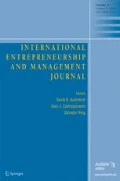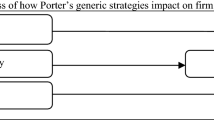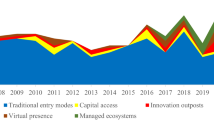Abstract
Despite being a relatively new concept, the importance of the global mindset is already well-documented. So far research has primarily focused on multinational companies and therefore the operationalization of the concept is still a work in progress. Recognizing the importance of entrepreneurs in small companies, yet mindful of the gaps that exist, this paper addresses the factors that constitute the global mindset and their influence on the internationalization of small Portuguese companies. Using information-processing theory through a quantitative, survey-based study and Structural Equation Modeling (SEM), the results show the importance of the characteristics of both entrepreneurs and firms in explaining the global mindset, and confirm the impact they have on internationalization behavior. The entrepreneur’s level of education, their satisfaction with company performance in the domestic market and the potential for growth in the domestic market all affect the global mindset model. The conclusions are useful for entrepreneurs and national authorities aiming to successfully implement internationalization practices, given the role of the global mindset in exploring global business opportunities and in the global success of companies. Replication of the research in different contexts is essential for the wider generalization of the results.


Similar content being viewed by others
References
Adler, N., & Bartholomew, S. (1992). Managing globally competent people. The Academy of Management Executive, 6(3), 52–65.
Akehurst, G., Rueda-Armengot, C., López, S. V., & Palacios Marqués, D. (2011). Ontological supports of knowledge: Knowledge creation and analytical knowledge. Management Decision, 49(2), 183–194.
Andersén, J. (2011). Strategic resources and firm performance. Management Decision, 49(1), 87–98.
Anderson, J. C., Gerbing, D. W., & Hunter, J. E. (1987). On the assessment of unidimensional measurement: Internal and external consistency, and overall consistency criteria. Journal of Marketing Research, 24, 432–437.
Appelbaum, S. H., Roy, M., & Gilliland, T. (2011). Globalization of performance appraisals: Theory and applications. Management Decision, 49(4), 570–585.
Arbuckle, J. L. (2004). Amos 5.0 user’s guide. Chicago: Small Waters Corporation.
Arora, A., Jaju, A., Kefalas, A. G., & Perenich, T. (2004). An exploratory analysis of global managerial mindsets: A case of U.S. textile and apparel industry. Journal of International Management, 10(3), 393–411.
Baron, R. A., & Ensley, M. D. (2006). Opportunity recognition as the detection of meaningful patterns: Evidence from comparison of novice and experienced entrepreneurs. Management Science, 52(9), 1331–1344.
Bartlett, C. A., & Ghoshal, S. (1992). What is a global manager? Harvard Business Review, 70(5), 124–132.
Beechler, S., & Javidan, M. (2007). Leading with a global mindset. In M. A. Hitt, R. Steers, & M. Javidan (Eds.), The global mindset: Advances in international management, 19 (pp. 131–169). Oxford: Elsevier.
Begley, T. M., & Boyd, D. P. (2003). The need for a corporate global mindset. MIT Sloan Management Review, 44(2), 25–32.
Bell, J., Murray, M., & Madden, K. (1992). Developing expertise: An Irish perspective. International Small Business Journal, 10, 37–53.
Black, J. S., & Gregersen, H. B. (2000). High impact training: Forging leaders for the global frontier. Human Resource Management, 39(2&3), 173–184.
Black, J. S., Morrison, A. J., & Grgersen, H. B. (1999). Global explorers: The next generation of leaders. New York, NY: Routledge.
Bonet, F. J. P., Peris-Ortiz, M., & Pechuán, I. G. (2011). Basis for a general theory of organizations. Management Decision, 49(2), 270–283.
Bowen, D., & Inkpen, A. (2009). Exploring the role of “Global Mindset” in leading change in international contexts. The Journal of Applied Behavioral Science, 45(2), 239–260.
Cambra-Fierro, J., Florin, J., Perez, L., & Whitelock, J. (2011). Inter-firm market orientation as antecedent of knowledge transfer, innovation and value creation in networks. Management Decision, 49(3), 444–467.
Canina, L., Palacios, D., & Devece, C. (2012). Management theories linking individual and organizational level analysis in entrepreneurship research. International Entrepreneurship and Management Journal, 8, 271–284.
Cavalcante, S., Kesting, P., & Ulhøi, J. (2011). Business model dynamics and innovation: (re)establishing the missing linkages. Management Decision, 49(8), 1327–1342.
Chatterjee, S. R. (2005). Weaving the threads of a Global Mindset in work organizations: Managerial roles and responsibilities. Journal of Human Values, 11–37.
Chetty, S., & Campbell-Hunt, C. (2003). Paths to internationalization among small-to medium-sized firms: A global versus regional approach. European Journal of Marketing, 37(5/6), 796–820.
Clapp-Smith, R., & Hughes, L. (2007). Unearthing a global mindset: The process of international adjustment. Journal of Business and Leadership: Research, Practice, and Teaching, 3, 99–107.
Crowne, K. A. (2008). What leads to cultural intelligence? Business Horizons, 51, 391–399.
Earley, C. P., & Peterson, R. S. (2004). The elusive cultural chameleon: Cultural intelligence as a new approach to intercultural training for the global manager. The Academy of Management Learning and Education, 3(1), 100–115.
Erwee, R. (2007). Global business leadership and strategies. In J. Hough & E. Neuland (Eds.), Global business—Environments and strategies: Managing for global competitive advantage (pp. 221–242). Southern Africa, Cape Town: Oxford University Press. ISBN 9780195786828.
Etemad, H. (1999). Globalization and small and medium-sized enterprises: Search for potent strategies. Global Focus, (formerly Business and Contemporary World), 11(3), 85–105.
Fleck, D. L. (2010). Why we should dare to manage growth responsibly. Management Decision, 48(10), 1529–1538.
Fletcher, D. (2000). Learning to think global and act local: Experiences from the small business sector. Education and Training, 42, 211–219.
Fletcher, R. (2001). A holistic approach to internationalization. International Business Review, 10(1), 25–49.
Fornell, C., & Larcker, D. F. (1981). Evaluating structural equation models with unobservable variables and measurement error. Journal of Marketing Research, 18(1), 39–50.
Freitas, A. L., Gollwitzer, P. M., & Trope, Y. (2004). The influence of abstract and concrete mindsets on anticipating and guiding others’ self-regulatory efforts. Journal of Experimental Social Psychology, 40, 739–752.
Garver, M. S., & Mentzer, J. T. (1999). Logistics research methods: Employing structural equation modeling to test for construct validity. Journal of Business Logistics, 20, 33–57.
Giaglis, G. M., & Fouskas, K. G. (2011). The impact of managerial perceptions on competitive response variety. Management Decision, 49(8), 1257–1275.
Govindarajan, V., & Gupta, A. K. (2001). The quest for global dominance: Transforming global presence into global competitive advance. San Francisco: Jossey-Bass.
Gupta, A. K., & Govindarajan, V. (2002). Cultivating a global mindset. The Academy of Management Executive, 16(1), 116–126.
Hair, J. F., Jr., Anderson, R. E., Tatham, R. L., & Black, W. C. (1998). Multivariate data analysis (5th ed.). Upper Saddle River, New York: Prentice Hall.
Harveston, P., Kedia, B., & David, P. (2000). Internationalization of born global and gradual globalizing firms: The impact of the manager. Advances in Competitiveness Research, 8(1), 92–99.
Harvey, M., & Novicevic, M. M. (2001). The impact of hypercompetitive “timescapes” on the development of a global mindset. Management Decision, 39(6), 448–460.
Havnes, P. A. (2001). The dynamics of the internationalization process - Interpretation of empirical evidence, http://www.igw.unisg.ch/rencontres/band 2002/D_04_Havnes.pdf. Accessed, 27 June, 2012.
Hitt, M. A., Javidan, M., & Steers, R. M. (2007). The global mindset: An introduction. Advances in International Management, 19, 1–10.
Hormiga, E., Batista-Canino, R., & Sánchez-Medina, A. (2011). The role of intellectual capital in the success of new ventures. International Entrepreneurship and Management Journal, 7, 71–92.
Hotho, S., & Champion, K. (2011). Small businesses in the new creative industries: innovation as a people management challenge. Management Decision, 49(1), 29–54.
Houthoofd, N., Desmidt, S., & Fidalgo, E. G. (2010). Analyzing firm performance heterogeneity: The relative effect of business domain. Management Decision, 48(6), 996–1009.
Hoyle, R. H. (1995). The structural equitation modeling approach: Basic concepts and fundamental issues. In R. H. Hoyle (Ed.), Structural equation modeling: Concepts, issues, and applications (pp. 1–15). Thousand Oaks, CA: Sage.
Huang, C.-L., & Kung, F.-H. (2011). Environmental consciousness and intellectual capital management: Evidence from Taiwan’s manufacturing industry. Management Decision, 49(9), 1405–1425.
Javidan, M., Steers, R. M., & Hitt, M. A. (2007). The global mindset. Advances in International Management, 19, 215–226. Series Editors: Joseph L.C. Cheng and Michael A. Hitt.
Jöreskog, K., & Sörbom, D. (1993). LISREL 8: Structural Equation Modeling with the SIMPLIS Command Language. Chicago, IL: Scientific Software International Inc.
Katsikeas, C. S., Leonidou, L. C., & Morgan, N. A. (2000). Firm level export performance assessment: Review, evaluation, and development. Journal of the Academy of Marketing Science, 28(4), 493–511.
Kedia, B. L., & Mukherji, A. (1999). Global managers: Developing a mindset for global competitiveness. Journal of World Business, 34(3), 230–251.
Kefalas, A. G., & Weatherly, E. W. (1998). Global mindsets among college students in the United States and elsewhere: are we growing a globally minded workforce? Unpublished manuscript.
Kefalas, A. G. (1998). Think globally, act locally. Thunderbird International Business Review, 40(6), 547–562.
Kegan, R. (1983). The evolving self: Problem and process in human development. Cambridge, MA: Harvard University Press.
Kets de Vries, M. F. R., & Florent-Treacy, E. (2002). Global leadership from A to Z: Creating high commitment organizations. Organizational Dynamics, 295(309), 1–16.
Kline, R. B. (2005). Principles and practice of structural equation modeling (2nd ed.). New York: The Guilford Press.
Kobrin, S. J. (1994). Is there a relationship between a geocenttic mind-set and multinational strategy? Journal of International Business Studies, 25(3), 493–551.
Kyvik, O. (2006). Internationalization of small firms: A cognitive perspective - An empirical assessment of the relationship between decision makers’ global mindset and Norwegian small firms’ internationalization behavior. Spain: Doctoral dissertation. ESADE Business School, Universitat Ramon Llull.
Lane, D. A., & Down, M. (2010). The art of managing for the future: Leadership of turbulence. Management Decision, 48(4), 512–527.
Leonard, N. H., Scholl, R. W., & Kowaslski, K. B. (1999). Information processing style and decision making. Journal of Organizational Behavior, 20(3), 407–420.
Leonidou, L. C., Katsikeas, C. S., & Samiee, S. (2002). Marketing strategy determinants of export performance: A meta-analysis. Journal of Business Research, 55, 51–67.
Levy, O., Beechler, S., Taylor, S., & Boyacigiller, N. (2007). What we talk about when we talk about global mindset: Managerial cognition in multinational corporations. Journal of International Business Studies, 38(2), 231–258.
Maznevski, M. L., & Lane, H. W. (2004). Shaping the global mindset: Designing educational experiences for effective global thinking and action. In N. Boyacigiller, R. M. Goodman, & M. Phillips (Eds.), Teaching and experiencing cross-cultural management: Lessons from master teachers (pp. 171–184). New York: Routledge.
McCall, M., & Hollenbeck, G. (2002). Development experiences of global executives. Cambridge, Mass.: Harvard Business School.
Murtha, T. P., Lenway, S. A., & Bagozzi, R. P. (1998). Global mindsets and cognitive shifts in a complex multinational corporation. Strategic Management Journal, 19, 97–114.
Nadkarni, S., & Perez, P. D. (2007). Prior conditions and early international commitment: The mediating role of domestic mindset. Journal of International Business Studies, 38(1), 160–176.
Namvar, M., Fathian, M., Akhavan, P., & Gholamian, M. R. (2010). Exploring the impacts of intellectual property on intellectual capital and company performance: The case of Iranian computer and electronic organizations. Management Decision, 48(5), 676–697.
Nandakumar, M. K., Ghobadian, A., & O’Regan, N. (2010). Business-level strategy and performance: The moderating effects of environment and structure. Management Decision, 48(6), 907–939.
Nerlove, S. B., & Snipper, A. S. (1981). Cognitive consequences of cultural opportunity. In R. H. Munroe, R. L. Munroe, & B. B. Whiting (Eds.), Handbook of cross-cultural human development (pp. 423–467). New York: Garland STPM press.
Nummela, N., Saarenketo, S., & Puumalainen, K. (2004). A global mindset—A prerequisite for successfuli? Canadian Journal of Administrative Sciences, 21(1), 51–64.
Oddou, G., Mendenhall, M. E., & Ritchie, J. B. (2000). Leveraging travel as a tool for global leadership development. Human Resource Management, 39(2&3), 159–172.
Osland, J., & Osland, A. (2006). Expatriate paradoxes and cultural involvement. International Studies of Management and Organizations, 35(4), 91–114.
Ramírez, A. R., Orejuela, A. R., & Vargas, G. M. (2010). New perspectives for the managerial entrepreneurship. International Entrepreneurship and Management Journal, 6, 203–219.
Redding, S. G. (2007). The chess master and the 10 simultaneous opponents: But what if the game is poker? Implications for the global mindset. In M. Javidan, R. M. Steers, & M. A. Hitt (Eds.), The Global Mindset, 19 (pp. 49–73). New York: Elsevier.
Reed, R., & Storrud-Barnes, S. (2010). Uncertainty, risk, and real options: Who wins, who loses? Management Decision, 48(7), 1080–1089.
Rhinesmith, S. H. (1992). Global mindsets global managers. Training & Development, 46(10), 63–69.
Rueda-Armengot, C., & Peris-Ortiz, M. (2012). The emigrant entrepreneur: A theoretical framework and empirical approximation. International Entrepreneurship and Management Journal, 8, 99–118.
Sharabati, A.-A., Jawad, S. N., & Bontis, N. (2010). Intellectual capital and business performance in the pharmaceutical sector of Jordan. Management Decision, 48(1), 105–131.
Tabachnick, B. G., & Fidell, L. S. (2001). Using multivariate statistics (4th ed.). New York: Harper Collins.
Taylor, S., Levy, O., Boyacigiller, N. A., & Beechler, S. (2008). Employee commitment in MNCs: Impacts of organizational culture, HRM, and top management orientations. The International Journal of Human Resource Development, 19(4), 501–527.
Townsend, P., & Cairns, L. (2003). Developing the global manager using a capability framework. Management Learning, 34(3), 313–327.
Tseng, C.-H., Tansuhaj, P. S., & Rose, J. (2004). Are strategic assets contributions or constraints for SMEs to go international? An empirical study of the US manufacturing sector. Journal of American Academy of Business, 5(1/2), 246–254.
Welch, L. S., & Luostarinen, R. K. (1993). Inward-outward connections in internationalization. Journal of International Marketing, 1(1), 44–56.
Yang, T. T., & Li, C. R. (2011). Competence exploration and exploitation in new product development: The moderating effects of environmental dynamism and competitiveness. Management Decision, 49(9), 1444–1470.
Yin, E., Johnson, J., & Bao, Y. (2008). Global mindedness and the performance of Chinese multinationals. Boston, USA: Proceedings of the China goes global Conference, Harvard University. October 8–10.
Zahra, S. A. (1998). Competitiveness and global leadership in the 21st century. The Academy of Management Executive, 12(4), 10–12.
Author information
Authors and Affiliations
Corresponding author
Rights and permissions
About this article
Cite this article
Felício, J.A., Caldeirinha, V.R. & Rodrigues, R. Global mindset and the internationalization of small firms: The importance of the characteristics of entrepreneurs. Int Entrep Manag J 8, 467–485 (2012). https://doi.org/10.1007/s11365-012-0232-5
Published:
Issue Date:
DOI: https://doi.org/10.1007/s11365-012-0232-5




